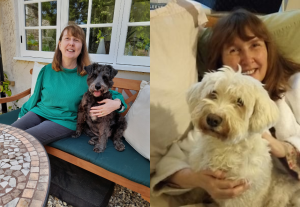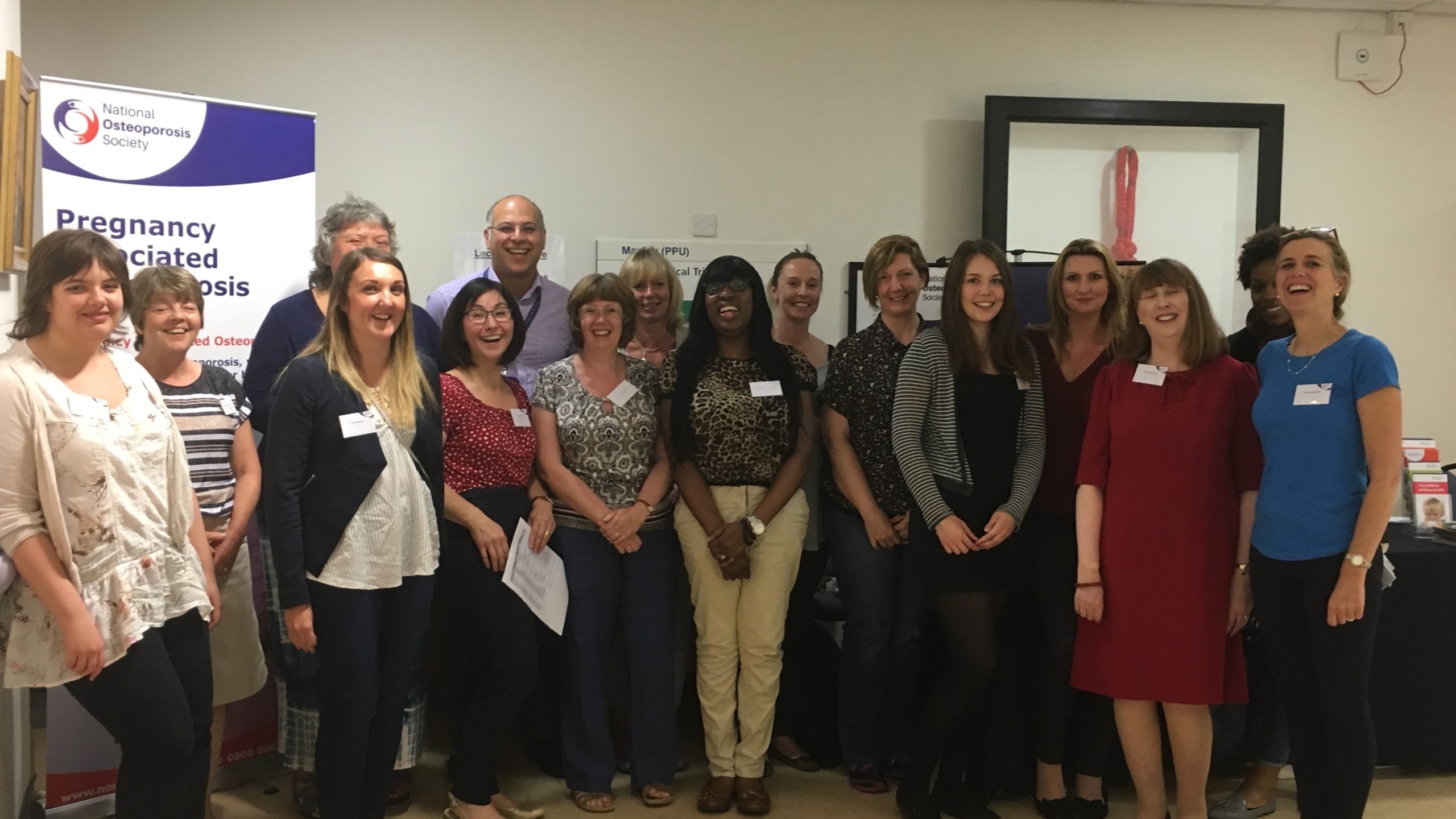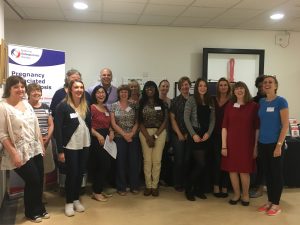

Coordinating my care – an ongoing personal battle
Karen has Pregnancy Associated Osteoporosis. The condition has forced a difficult, limited and restricted life which has been made harder with the lack of well coordinated care. This is her story.
33 years ago, pregnant at the age 28, my spine collapsed in labour. After a difficult diagnostic odyssey, being medically disbelieved and having to change GP to be listened to, I was eventually diagnosed with pregnancy associated osteoporosis (PAO). A rare, and very much unknown osteoporosis, a type of bone condition.
PAO is a rare type of osteoporosis where women fracture in pregnancy or in the first few months after childbirth. Mainly spines or hips break. My spine collapsed in and around labour leaving me unable to care for my baby.
Over the years, my husband, daughter and I have lived a difficult, limited and restricted life. I have experienced fracture after painful fracture – 24 known in total, before X-rays were stopped due to concerns over exposure to radiation. I was repeatedly told by specialists they just didn’t know of, or had not heard about, this type of osteoporosis.
It was difficult because I was young and looked well. People would be incredulous, not believing that I was ill. It was incredibly difficult living with an unknown bone condition, which was also a rare type of a more widely known existing condition. Unfortunately for me, the long-term side effects of the bone condition treatment also led to breast cancer and a subarachnoid brain haemorrhage. Just some seven years ago, I was discharged by the specialists I was seeing, as my condition was ‘too difficult and challenging’ and was placed back under GP care. Facing the menopause, when women usually get osteoporosis, I was mentally and physically at rock bottom – I felt like I could not go on. Thankfully, I was unexpectedly taken on by Addenbrooke’s hospital in Cambridge, just at the right moment, who obtained new treatment for me, which stopped me fracturing and who then continued to provide long-distance rare condition specialist care for over ten years.
Challenges
Over the years coordinating my own medical care has been a challenge, not least during Covid. Being separated for many months during the first lockdown, when I was on the highly-vulnerable list thanks to my rare condition, my husband and I had decided it was time to move to be nearer our daughter. I had asked my GP of over 30 years if I could continue as their patient, if I moved. Having been assured yes, in writing, I then asked all my various local hospital specialists the same thing and had the same assurances, they could continue with me as a long distant patient, if I remained with the same GP. For my rare bone condition, I was assured that I could continue as a rare condition long distance patient with Addenbrooke’s hospital in Cambridge too. I would never have moved, if it meant jeopardising any of my medical care.
Everything seemed to be running fine, with my ongoing medical care, during lockdown number 2, when I ended up staying temporarily with my daughter for 6 months, due to my first house purchase falling through
A call that changed everything
Having moved into permanent new accommodation, I was horrified to receive a call from my GP’s new practice manager and be told they could no longer continue to see me as a long distance patient. I needed to find a new local GP, I was told. My old GP sent me an apology card in the post and contacted me and promised they would continue to support me as long as they were allowed. After 30 years, we got to know each other very well and it was they who said ‘we have been through so much together’.
I asked my new neighbours and applied to join the GP practice they recommended locally, which took me and my husband on as new patients. I had a telephone interview with one of the GP’s running the practice, who when hearing I was living with a rare condition said, ‘well, you will keep us on our toes’.
It was very difficult, getting used to different GP surgery procedures and ways. The new GP surgery referred me on to various other local hospitals. Unfortunately, this was at the time of huge hospital backlogs and waiting lists. Many NHS consultations with new specialists and what were previous regular consultations and testing now faced huge delays, with a real impact on my physical and mental health.

Life on hold
My husband and I had purchased a ‘retirement wreck renovation project’ but now found ourselves instead having to delay or just cancel work on our new house. We instead had to use renovation money for my medical care, paying for private appointments and treatments and then surgery. All the previously booked builders and local craftsmen have been incredibly understanding, kind and sympathetic.
My husband and I have calculated that, since moving, we have spent over £70k of our personal money on my medical care. This is obviously unsustainable.
Shocking conversations
I was used to having my previous GP listening and believing me and supporting me when I appealed for help. But with my new GP surgery, they initially seemed to be struggling to believe, understand or help me. I was shocked to have GPs phone me and query ‘so what makes you think you might have osteoporosis? Are you sure you really do have osteoporosis?’ I felt like those TV adverts, replying ‘I do not just have osteoporosis. I have rare idiopathic pregnancy associated osteoporosis. I’ve had 14 vertebral fractures and 5 inch height loss…’
Or if new healthcare professionals believe PAO does exist and I’ve been diagnosed with it, they seem unsure what to do with me. One very senior consultant actually said, fairly recently ‘Well, you are like a unicorn or a fairytale aren’t you?’ and elaborated ‘You have one of those rare conditions we are told exist, but are not sure they really do and you never ever expect to see a patient with them’.
My relationships with my husband, daughter, friends and family all deteriorated badly. They were all fed up of hearing my constant complaints about how I wished I had never moved and about all the difficulties of coordinating my new medical care.

Mental health deterioration
I’d had a past psychologist diagnosis of complex PTSD, triggered by and linked to medical trauma and difficulties. I had received extensive Neuropsychologist treatment for this and it was under control. But now, faced with new, ongoing medical difficulties, my PTSD flared up terribly with all this. My coping techniques were not coping at all! Such that I started paying for private weekly Trauma Counselling, while on yet another long NHS waiting list for mental health support.
Rare Diseases Framework
Moving forward, things have changed medically, with the new Rare Diseases Framework – Addenbrooke’s hospital in Cambridge, who had seen me as a long-distance rare bone condition patient for over 10 years, now, under the new Framework, suddenly and unexpectedly tried to refer me to a new hospital in my new part of the country, talking of transitioning my care there. After a worrying 9 months and lack of medical care, eventually I am now, thankfully, under the care of the Royal National Orthopaedic Hospital, who have given me some past treatment and already know my medical case. The RNOH has a great rare bone condition service, a large clinical group of patients with PAO and a coordinating specialist rare disease nurse – similar to how Macmillan nurses care for Oncology patients – they have been a huge help to me lately, helping me coordinate my ongoing complicated medical care.
Without a GP or rare disease specialist – surely the new Rare Diseases Framework should not lead to this?
But, last year, for over 6 months I was without even a GP, or a definite hospital / UK Centre of Excellence / medical specialist looking after me with my rare condition. Once again, I had to ‘dig deep’ and pay privately for BUPA cover, which came with a GP service. All this situation, over the past 3 years, has cost dearly, in so many ways – relationship wise, physically, mentally and financially. Career wise, I had hoped to be able to find new employment after moving and settling in my new home, but to date this has proved impossible with the huge amount of time taken up with medical care. Compared to the start of Covid, I now find myself in a much worse position, considering selling what was supposed to be our new home.

PAO Support Group
Since Covid, the ROS no longer has a PAO Patient Support Group and has also ended PAO patients being telephone helpline volunteers. We have an international private patient group on Facebook. Our informal network of UK PAO patients have been liaising and meeting though and supporting ground breaking new UK research, which we hope will give some answers about our rare condition. We started up a new awareness raising campaign in 2023 with a new public Facebook page and now, in 2024, are trying to become a new UK registered charity and setup a new PAO website.
Thankfully there is Genetic Alliance UK. We have supported Rare Disease Day in the past and organised a campaign around Rare Disease Day 2024, #MeasureThatMum – while progressing our charity application, we continue trying to raise awareness about Pregnancy Associated Osteoporosis and the new UK Research. In addition Genetic Alliance UK and Cambridge Rare Disease Network over the past year have also kindly helped with our new campaign.
It is 33 years since I was first diagnosed and faced terrible difficulties with diagnosis and care and treatment access. It is so wrong that young PAO mums with my condition and their families are still facing the same difficulties. Plus older mothers such as myself, although diagnosed, are still facing such ongoing problems with care and treatment and support. This particular rare condition in my case has had a huge and life-long and life-limiting impact on all aspects of my life – my career, finances, my family, my relationships, on me both physically and mentally. I would like to ensure it is better known and understood so that in the future young mothers do not face my experience.
